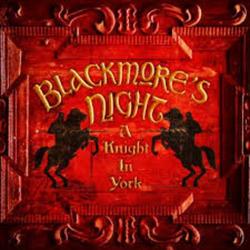Shadow Of The Moon - Blackmore's Night
$ 5.99 – $ 8.99
Shadow of the Moon is the first album by Ritchie Blackmore's beloved Blackmore's Night project.
The former Deep Purple and Rainbow guitarist and his fiancée, vocalist Candice Night, created a Renaissance-inspired work with elements of folk, new age, and occasional bits of electric guitar.
Blackmore even plays bass, mandolin, drum (yes, singular), and tambourine.
Night's voice isn't powerful, but it's bright and sweet, making it perfect for this style of music.
Other musicians include co-producer Pat Regan on keyboards and the Minstrel Hall Consort; Gerald Flashman on recorder, trumpet, and French horn; Tom Brown on cello; and Lady Green on violin and viola.
Most songs are original compositions but some are based on traditional melodies.
"Shadow of the Moon" is a marvelous opener; it's catchy, haunting, and propulsive.
Blackmore shreds on acoustic guitar and lets the electric guitar slip into the background for faint power chords.
Regal, majestic horns lend an elegance to "The Clock Ticks On," which addresses the passage of time and a yearning to live in the past.
"Play Minstrel Play" features Jethro Tull's Ian Anderson, one of Blackmore's favorite musicians.
The song moves along pleasantly until about halfway through when it explodes into a frantic, handclaps-led pace with Anderson's wild flute solo.
The warmth of "Ocean Gypsy" makes it the song most easily classified as new age here; Blackmore plays a gentle but swift acoustic guitar melody under Night's softly yearning vocals.
"Writing on the Wall" is quite fast and has a danceable beat, and there's even a blowout jam at the end.
Blackmore's electric guitar work is the most prominent on "No Second Chance" and "Wish You Were Here." The instrumental "Possum's Last Dance" is a U.S.-only bonus track.
| Title/Composers | Performer | Listen | Time | Size | Size | |
|---|---|---|---|---|---|---|
| 1 | Shadow of the MoonRitchie Blackmore, Candice Night | Blackmore's Night | Play | 05:07 | 11 MB | 34 MB |
| 2 | The Clock Ticks OnRitchie Blackmore, Candice Night | Blackmore's Night | Play | 05:15 | 12 MB | 34 MB |
| 3 | Be Mine TonightRitchie Blackmore, Candice Night | Blackmore's Night | Play | 02:51 | 6 MB | 19 MB |
| 4 | Play Minstrel PlayRitchie Blackmore, Candice Night | Blackmore's Night, Ian Anderson | Play | 03:57 | 9 MB | 27 MB |
| 5 | Ocean GypsyMichael Dunford, Betty Thatcher | Blackmore's Night | Play | 06:06 | 13 MB | 37 MB |
| 6 | Minstrel HallRitchie Blackmore | Blackmore's Night | Play | 02:35 | 5 MB | 13 MB |
| 7 | Magical WorldRitchie Blackmore, Candice Night, Wassailers | Blackmore's Night | Play | 04:00 | 9 MB | 27 MB |
| 8 | Writing on the WallRitchie Blackmore, Candice Night, Pyotr Il'yich Tchaikovsky | Blackmore's Night | Play | 04:35 | 10 MB | 32 MB |
| 9 | Renaissance FaireRitchie Blackmore, Candice Night | Blackmore's Night | Play | 04:16 | 9 MB | 29 MB |
| 10 | MemmingenRitchie Blackmore | Blackmore's Night | Play | 01:05 | 2 MB | 5 MB |
| 11 | No Second ChanceRitchie Blackmore, Candice Night | Blackmore's Night | Play | 05:38 | 12 MB | 40 MB |
| 12 | Spirit of the SeaRitchie Blackmore, Candice Night | Blackmore's Night | Play | 04:50 | 11 MB | 30 MB |
| 13 | GreensleevesTraditional | Blackmore's Night | Play | 03:46 | 8 MB | 24 MB |
| 14 | Wish You Were HereL. Teijo | Blackmore's Night | Play | 05:01 | 11 MB | 34 MB |
| 15 | Mond Tanz | Blackmore's Night | Play | 03:33 | 8 MB | 22 MB |
| 16 | Minstrel Hall (Bonustrack Version) | Blackmore's Night | Play | 02:33 | 5 MB | 14 MB |
| 65 mins | 149 MB | |||||
| 65 mins | 427 MB | |||||
| Artist | Job | |
|---|---|---|
| 1 | Ian Anderson | Flute, Guest Artist, Primary Artist |
| 2 | Blackmore's Night | Performer, Primary Artist |
| 3 | Ritchie Blackmore | Arranger, Bass, Composer, Drums, Drums (Snare), Guitar (Acoustic), Guitar (Electric), Mandolin, Primary Artist, Producer, Tambourine |
| 4 | Tom Brown | Cello |
| 5 | Michael Dunford | Composer |
| 6 | Gerald Flashmen | French Horn, Recorder, Trumpet |
| 7 | Lady Green | Viola, Violin |
| 8 | Scott Hazel | Vocals (Background) |
| 9 | Scott Hazell | Vocals (Background) |
| 10 | Joseph James | Producer |
| 11 | Michael Keel | Back Cover, Photography |
| 12 | Candice Night | Arranger, Composer, Vocals, Vocals (Background) |
| 13 | Johanna Pieterman | Artwork, Cover Art |
| 14 | Pat Regan | Engineer, Keyboards, Mixing, Producer |
| 15 | Pyotr Il'yich Tchaikovsky | Composer |
| 16 | L. Teijo | Composer |
| 17 | Betty Thatcher | Composer |
| 18 | Traditional | Composer |
| 19 | Brad Vance | Mastering |
| 20 | Wassailers | Composer |
Blackmore's Night
| Quality | Format | Encoding | Description |
|---|---|---|---|
| Standard | MP3 | 320kps 44.1kHz | MP3 is an audio coding format which uses a form of lossy data compression. The highest bitrate of this format is 320kbps (kbit/s). MP3 Digital audio takes less amount of space (up to 90% reduction in size) and the quality is not as good as the original one. |
| CD Quality | FLAC | 16bit 44.1kHz | FLAC is an audio coding format which uses lossless compression. Digital audio in FLAC format has a smaller size and retains the same quality of the original Compact Disc (CD). |







